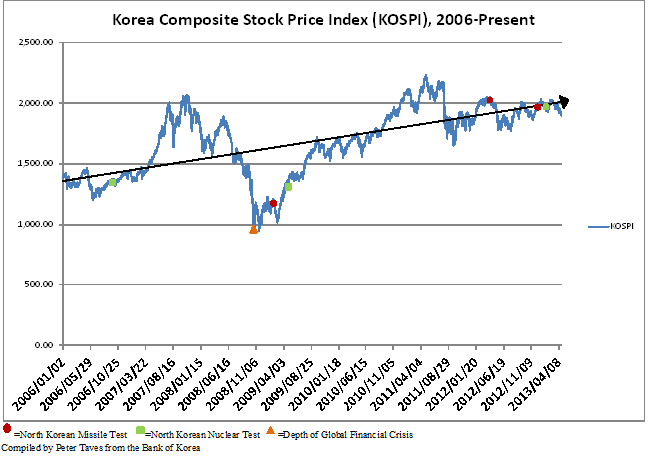The Peninsula
North Korea’s Economic Warfare

By Phil Eskeland
During the past several weeks, international viewers were treated to a series of broadcasts from major news outlets trumpeting every bellicose statement and video from Democratic People’s Republic of Korea (DPRK). This culminated two weeks ago, in the run-up to two North Korean anniversaries where “something” was expected to happen, with one hour specials on possible war scenarios and sensationalizing the military threat, including an analysis by a retired U.S. Army general about the possibility of North Korea seizing Pyeongchang, the site of the 2018 Winter Olympic Games. As a result of these and other reports, some foreign investors in South Korea were considering contingency plans for production and workers. Other firms were rethinking plans to invest in South Korea. Yet, if you walked the streets of any city in South Korea, you would find that business was going on as normal and most people brushed off the shrill rhetoric from North Korea as a part of a regular occurrence that happens every spring when the United States and the Republic of Korea (ROK) embark on their annual military training exercises. Nevertheless, there was a huge gap between international media coverage of North Korea in early April (be worried! prepare! be ready to go to underground shelters! imminent missile launch!) and the view from the streets of South Korea (shrug). Now that North Korean invectives have diminished in recent days, media attention has gravitated to the next story.
However, while North Korea would be overwhelmingly and quickly defeated in any military action against South Korea, what was behind North Korea’s heightened rhetoric and actions? We know that because regime survival is North Korea’s primary objective, their leaders are not suicidal. Why then does North Korea make these bizarre provocations? Many have pointed to the need for the relatively new and young North Korean leader Kim Jong Un to assert his leadership credentials and toughness, particularly by continuing with the North’s military-first policy. Perhaps the North Korean leadership believes that China will never substantively crack down on them. Even so, some have raised questions about North Korea suspending work at the joint ROK/DPRK Kaesong complex, which employed 53,000 North Koreans, representing 1 out of 5 people living in Kaesong, and brought in an estimated $80 million of desperately needed hard currency in 2012 for the DPRK regime. To these observers, suspending work Kaesong didn’t make any sense and was not in North Korea’s economic interest. In fact, they believe it hurts the North by denying work opportunities for its citizens and eliminating a valuable source of hard currency.
However, North Korea’s recent actions, including the suspension of work at Kaesong, are a form of psychological and economic warfare against South Korea in response to heightened international sanctions against North Korea. While South Korean citizens have become used to the threat from North Korea over the past 60 years and go about their daily lives, those who live outside of Northeast Asia were taken-aback by this augmented bellicose talk and action from the North. This work-suspension order by the DPRK affects more than just the relatively small economic benefit of Kaesong. Anything that North Korea can do to shake the confidence of foreign investors in South Korea is a political win for North Korea. If North Korean words and actions cause any foreign investor to withdraw from South Korea for political risk concerns, that would be an immense victory for the North. That’s why foreign investors should not be spooked by the shrill North Korean rhetoric because that only plays into the hands of the North Korean leadership. These tactics are a non-kinetic way for North Korea to inflict damage on South Korea. The North knows they cannot defeat South Korea militarily so the DPRK resorts to these unconventional and potentially untraceable methods.
On April 11, 2013, South Korean President Park Geun-hye met with representatives of foreign investors to reassure them that South Korea is a safe place to invest. President Park told the participants that “a stable environment will continue to be made in which you can feel secure and make investment and conduct business.”
Whenever North Korea has embarked on their reckless course of action in the past, the South Korean economy has remained strong (see chart). Sometimes, there was a temporary drop in the measurements of the strength of the Korean economy, but in every instance, the markets recovered and grew even stronger. At no time did the international bond ratings of South Korea drop as a result of North Korean threats. The same occurred during this latest round of provocations from North Korea – in fact, the Korean Composite Stock index grew during the week of the highest tensions, and foreign direct investment reached $3.39 billion in the first quarter of this year, representing a 45 percent increase from a year ago. Fortunately, the company representatives present at the April 11th meeting recognized these facts and reaffirmed confidence in the business environment in South Korea. Some companies even outlined plans for expansion and growth. But not every foreign company with a presence or plan to operate in South Korea was present at this meeting. These firms need to look behind the saber-rattling special reports of cable news networks on North Korea and look at the big picture – while South Korea is sufficiently prepared to deter any DPRK provocation, it is also open for business and is still an attractive place for foreign investment. Now that belligerent North Korean rhetoric has dampened somewhat, it is important for foreign investors in Korea to remember this lesson for next time, particularly as another North Korean anniversary looms on the horizon with potentially more provocative behavior by the DPRK.
Phil Eskeland is the Executive Director of Operations and Policy for the Korea Economic Institute of America. The views expressed here are his own.
Photo from Luther Bailey’s photostream on flickr Creative Commons.
